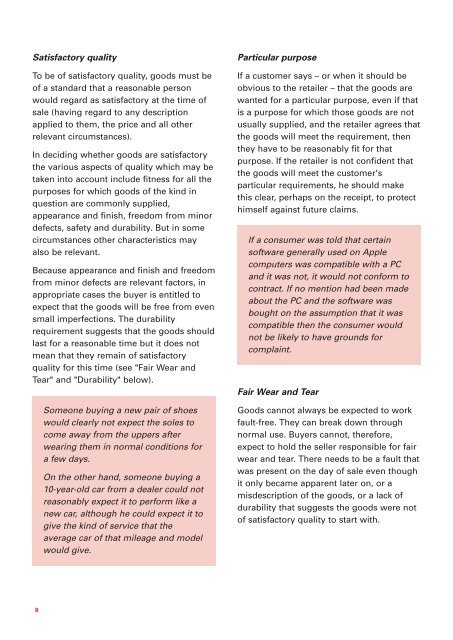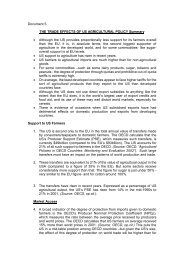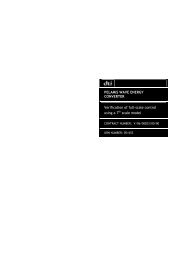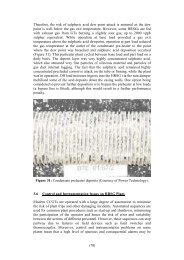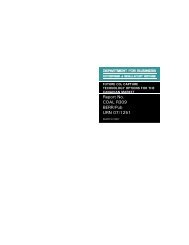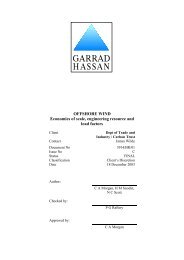A traders guide: the law relating to the - DTI Home
A traders guide: the law relating to the - DTI Home
A traders guide: the law relating to the - DTI Home
You also want an ePaper? Increase the reach of your titles
YUMPU automatically turns print PDFs into web optimized ePapers that Google loves.
Satisfac<strong>to</strong>ry quality<br />
To be of satisfac<strong>to</strong>ry quality, goods must be<br />
of a standard that a reasonable person<br />
would regard as satisfac<strong>to</strong>ry at <strong>the</strong> time of<br />
sale (having regard <strong>to</strong> any description<br />
applied <strong>to</strong> <strong>the</strong>m, <strong>the</strong> price and all o<strong>the</strong>r<br />
relevant circumstances).<br />
In deciding whe<strong>the</strong>r goods are satisfac<strong>to</strong>ry<br />
<strong>the</strong> various aspects of quality which may be<br />
taken in<strong>to</strong> account include fitness for all <strong>the</strong><br />
purposes for which goods of <strong>the</strong> kind in<br />
question are commonly supplied,<br />
appearance and finish, freedom from minor<br />
defects, safety and durability. But in some<br />
circumstances o<strong>the</strong>r characteristics may<br />
also be relevant.<br />
Because appearance and finish and freedom<br />
from minor defects are relevant fac<strong>to</strong>rs, in<br />
appropriate cases <strong>the</strong> buyer is entitled <strong>to</strong><br />
expect that <strong>the</strong> goods will be free from even<br />
small imperfections. The durability<br />
requirement suggests that <strong>the</strong> goods should<br />
last for a reasonable time but it does not<br />
mean that <strong>the</strong>y remain of satisfac<strong>to</strong>ry<br />
quality for this time (see "Fair Wear and<br />
Tear" and "Durability" below).<br />
8<br />
Someone buying a new pair of shoes<br />
would clearly not expect <strong>the</strong> soles <strong>to</strong><br />
come away from <strong>the</strong> uppers after<br />
wearing <strong>the</strong>m in normal conditions for<br />
a few days.<br />
On <strong>the</strong> o<strong>the</strong>r hand, someone buying a<br />
10-year-old car from a dealer could not<br />
reasonably expect it <strong>to</strong> perform like a<br />
new car, although he could expect it <strong>to</strong><br />
give <strong>the</strong> kind of service that <strong>the</strong><br />
average car of that mileage and model<br />
would give.<br />
Particular purpose<br />
If a cus<strong>to</strong>mer says – or when it should be<br />
obvious <strong>to</strong> <strong>the</strong> retailer – that <strong>the</strong> goods are<br />
wanted for a particular purpose, even if that<br />
is a purpose for which those goods are not<br />
usually supplied, and <strong>the</strong> retailer agrees that<br />
<strong>the</strong> goods will meet <strong>the</strong> requirement, <strong>the</strong>n<br />
<strong>the</strong>y have <strong>to</strong> be reasonably fit for that<br />
purpose. If <strong>the</strong> retailer is not confident that<br />
<strong>the</strong> goods will meet <strong>the</strong> cus<strong>to</strong>mer's<br />
particular requirements, he should make<br />
this clear, perhaps on <strong>the</strong> receipt, <strong>to</strong> protect<br />
himself against future claims.<br />
If a consumer was <strong>to</strong>ld that certain<br />
software generally used on Apple<br />
computers was compatible with a PC<br />
and it was not, it would not conform <strong>to</strong><br />
contract. If no mention had been made<br />
about <strong>the</strong> PC and <strong>the</strong> software was<br />
bought on <strong>the</strong> assumption that it was<br />
compatible <strong>the</strong>n <strong>the</strong> consumer would<br />
not be likely <strong>to</strong> have grounds for<br />
complaint.<br />
Fair Wear and Tear<br />
Goods cannot always be expected <strong>to</strong> work<br />
fault-free. They can break down through<br />
normal use. Buyers cannot, <strong>the</strong>refore,<br />
expect <strong>to</strong> hold <strong>the</strong> seller responsible for fair<br />
wear and tear. There needs <strong>to</strong> be a fault that<br />
was present on <strong>the</strong> day of sale even though<br />
it only became apparent later on, or a<br />
misdescription of <strong>the</strong> goods, or a lack of<br />
durability that suggests <strong>the</strong> goods were not<br />
of satisfac<strong>to</strong>ry quality <strong>to</strong> start with.


